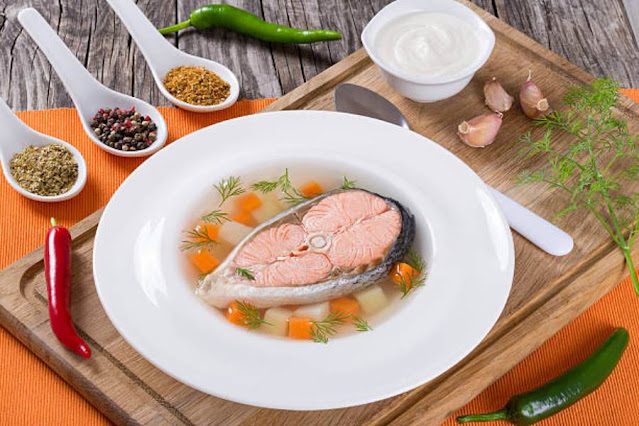Featured
- Get link
- X
- Other Apps
Foods to Avoid If You Have Oily Skin

Oily skin can be a task to manage, often leading to issues
like acne, clogged pores, and a persistent shine. While genetics and hormonal
factors play a significant role in determining skin type, dietary choices can
also impact the condition of your skin, particularly if you have oily skin.
Certain foods can exacerbate oil production and lead to skin problems. In this thing,
we'll delve into the foods you should consider avoiding if you have oily skin
and explore healthier alternatives for maintaining a clearer complexion. Read More: technoologyinnovation
Introduction to Oily Skin and its Causes
Oily skin befalls when the sebaceous glands in the skin harvest
an excess amount of sebum, an oily substance that helps lubricate and defend
the skin. This excess sebum can combine with dead skin cells and lead to
clogged pores, which in turn can result in various skin issues. Genetics,
hormonal changes, and environmental factors all play a role in the development
of oily skin. However, diet can also influence sebum production and skin health.
Impact of Diet on Oily Skin
Research suggests that certain dietary choices can influence
the manufacture of sebum and the overall health of the skin. Foods high in
refined carbohydrates, unhealthy fats, and dairy have been linked to increased
sebum production and skin inflammation. By avoiding or minimizing the
consumption of these foods, individuals with oily skin can potentially improve
their skin's appearance and reduce the occurrence of acne and breakouts.
Foods to Avoid for Oily Skin
Dairy Products: Dairy contains hormones that can disrupt the
hormonal stability in your body, leading to increased oil production. It's best
to avoid or reduce the intake of milk, cheese, and yogurt.
Fried and Greasy Foods: Foods that are high in unhealthy
fats and are fried can contribute to inflammation and clogged pores. French
fries, fried chicken, and other greasy foods should be consumed in moderation.
Sugary Snacks and Sweets: High-sugar foods like candies,
pastries, and sugary beverages can lead to spikes in insulin levels, which may
trigger an increase in sebum production and contribute to acne.
White Bread and Refined Grains: Refined carbohydrates, found
in white bread, pasta, and baked goods, have a high glycemic directory and can
lead to inflammation and higher sebum production.
Processed and Fast Foods: These foods often contain
unhealthy fats, additives, and preservatives that can contribute to skin
issues. Opt for whole, unprocessed foods whenever possible.
Sodas and Sugary Drinks: Sugary beverages can lead to insulin spikes and cause inflammation, potentially worsening oily skin conditions.
Excessive Caffeine: While moderate caffeine intake is
generally fine, excessive consumption can lead to dehydration, which may prompt
the skin to produce more oil to compensate.
Alcohol: Alcohol can dehydrate the skin, causing an
overproduction of oil to compensate for the lost moisture. Excessive alcohol
consumption can exacerbate oily skin issues.
Spicy Foods: Spicy foods can dilate blood vessels and lead
to amplified blood flow to the skin, potentially triggering oil production and
causing redness.
High-Sodium Foods: Foods high in sodium can principal to
water holding and bloating, affecting the skin's appearance and exacerbating
oiliness.
Healthy Alternatives for Clearer Skin
Instead of focusing solely on what to avoid, it's essential
to incorporate skin-friendly foods into your diet. Here are some options to
consider:
Omega-3 Fatty Acids: Originate in fatty fish like salmon and
chia seeds, omega-3 fatty acids have anti-inflammatory properties that can help
recover skin health.
Antioxidant-Rich Foods: Berries, leafy greens, and nuts are
rich in antioxidants that can shield the skin from damage caused by free
radicals.
Whole Grains: Choose for whole grains like quinoa, brown
rice, and oats, which have a lower glycemic index and can help maintain stable
insulin levels.
Lean Proteins: Incorporate lean bases of protein such as
poultry, beans, and lentils into your diet to support skin repair and collagen
production.
Healthy Fats: Consume foods with healthy fats like avocados,
nuts, and olive oil, which can assistance maintain skin hydration and
elasticity.
Hydration: Drink plenty of water through the day to keep your
skin hydrated and balanced.
Conclusion
While dietary changes alone may not completely eliminate
oily skin, they can play a role in managing its effects. Avoiding or minimizing
foods that promote inflammation and sebum production, and incorporating a
variety of skin-friendly nutrients into your diet, can contribute to clearer,
healthier skin. As everyone's body responds differently to various foods, it's
a good idea to consult with a dermatologist or nutritionist to tailor your diet
to your specific skin needs. Remember that a holistic approach that combines a stable
diet, proper skincare, and a healthy lifestyle will yield the best results for
maintaining radiant skin.
- Get link
- X
- Other Apps

